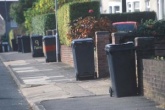Salford considering three-weekly collections

A report to be presented to the cabinet next Tuesday (24 November) proposes an initial pilot in the western half of the city, reducing collections of residual waste from fortnightly to every three weeks. This pilot would run from July 2016 to February 2017.
Areas of the city that would be included in the first wave of the pilot would be: Worsley, Boothstown, Ellenbrook, Irlam, Cadishead, Little Hulton, Swinton North, Swinton South, Pendlebury, Walkden North, and Walkden South.
Between March and July 2017 the system will be rolled out to a further 25 per cent of households. Depending on the success of the pilot, the reduced frequency system could then b delivered to every household in the borough, apart from high rises, from August 2017.
The council will continue to run its four-bin kerbside collection service. Under the current system, residual waste is collected fortnightly, a recycling bin containing paper and cardboard, and one for glass, plastic and aluminium are also taken every two weeks, while a final bin taking food and garden waste is collected every week.
There are no plans to alter the frequency of collection for recycling and organic waste. To incentivise recycling under the new system, the council also intends to launch a recycling reward scheme that will recognise communities that recycle effectively. The scheme has been the subject of a successful bid to the Department of Communities and Local Government (DCLG). The cabinet report also suggests that strong education and enforcement is implemented using partners, street champions and volunteers.
A report by the Manchester Evening News last month announced that freedom of information requests made to the council revealed that more than 10,000 complaints over missed wheelie bin collections had been made so far this year, with the areas of Worsley, Walkden and Boothtown – all included in the pilot area – submitting the most.
The primary reasons given for bins not being collected were the weight of the bin, bins being too full to be closed, or contamination of the bin’s specific material.
Savings
Projections for Salford’s disposal costs under the current system suggest that the £17.6 million that the council currently spends would increase to £18.0 million in 2016/17, and then rise even further to £19.7 million in 2017/18. Costs for 2018/19 would also be expected to increase by a further 13 per cent.
The council estimates that the proposed three-weekly system would see reductions of £470,000 in 2016/17, with £1.1 million savings following when the whole city is covered by the system in 2017/18. This cost reduction, which includes reduced landfill tax, operational costs and the removal of two vehicles from the city’s fleet, would then be available to the council for other uses.
In addition to the expected financial benefits, the council expects the new system to improve the city’s recycling rate, which currently stands at 42.3 per cent, and bring about ‘significant environmental benefits’ by reducing the amount of waste sent to landfill.
Change has great recycling potential
Councillor Gena Merrett, Executive Lead Member for Housing and Environment, said: “Salford’s waste disposal costs will increase significantly over the next three years if the city can’t increase recycling and reduce the costs of waste sent to landfill. This is at a time when it is important to reduce spending with pressures on council budgets to make £38 million of savings over the next two years.
“Other neighbouring authorities have higher rates of recycling, and our data shows that over a third of the contents of general waste bins could be recycled, so there is potential for increasing recycling with the support of residents.
“We have investigated a number of options for cabinet to consider next week and the recommendation is to introduce a pilot to test three-weekly collections for residual non-recyclable waste in nine wards. This is yet to be agreed, but if it is decided to make the change, it will be introduced carefully following the pilot. We will be consulting in full on progress of this.”
Three-weekly in Greater Manchester
Bury and Rochdale, both neighbouring authorities to Salford, have already moved to drive up recycling and reduce costs by limiting collection of residual waste.
Bury became the first English LA to adopt three-weekly collections in October 2014, and reported in August that its recycling rate rose by eight per cent in just two months following the system’s implementation. Bury Council moved to the system as part of its ‘Zero Waste Strategy’, and has targeted a recycling rate of 60 per cent (up from 47 per cent prior to the switch) by March 2016 as well as creating savings of ‘more than £800,000 per year’ in waste disposal and treatment costs.
Since Bury, a number of English LAs have trialled three-weekly waste systems, including Rochdale, which rolled its new system out across the borough last month.
Waste collected by all nine Greater Manchester councils is managed by the Greater Manchester Waste Disposal Authority (GMWDA) as part of a 25-year private finance initiative worth £4.7 billion. The GMWDA has set targets of reducing growth in waste to zero per cent by 2020 and increasing recycling and composting rates to 50 per cent the same year.
Collection of waste in Greater Manchester has therefore been standardised to the four waste streams used in Salford’s current bin system.
The full cabinet report into Salford’s waste management can be found on the council’s website.








